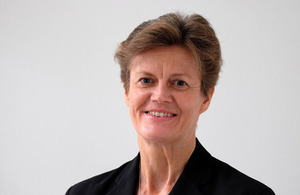Great Britain and China Are Global Partners
British Ambassador Dame Barbara Woodward’s Op-Ed on UK-China cooperation on global challenges

British Ambassador to China, Dame Barbara Woodward
The preparations for the 70th anniversary of the founding of the People’s Republic of China next month along with breakthroughs in science which have eradicated the scourge of smallpox and improved the lives of millions are reminders of global progress that we can celebrate.
But trans-national challenges still remain and threaten our friends and neighbours around the world: the natural disasters, death and havoc brought by climate change and extreme weather; the suffering of people living in extreme poverty; and the virulent spread of killer diseases — at least 2.5 million people died as a result of AIDS, tuberculosis and malaria in 2017.
The United Nations General Assembly, which opened this week in New York, is the world’s forum for addressing these challenges. The U.K. and China are active members and participants. We are also partners. And as permanent members of the UN Security Council, the U.K. and China have a particular responsibility to ensure that the UN is addressing the most pressing challenges facing the international community. For the past three years, for example, British and Chinese peacekeepers have been deployed in South Sudan, Africa’s youngest country, to protect its people from violence and instability; British and Chinese doctors and nurses have been tackling Ebola in West Africa.
Around the world, people face a myriad of challenges. As the world’s leaders meet in New York, I want to highlight three global challenges where we should strengthen international cooperation in the year ahead.
First, climate change is not a distant threat — as this week’s global climate strikes have reminded us. Accelerating action to reduce emissions and protect our environment is an urgent priority. We welcome President Xi’s strong support for the Paris Climate Change Agreement. At the UN General Assembly, the U.K. and China will co-lead the “resilience and adaptation” and “nature-based solutions” strands of the Secretary General’s Climate Action Summit. We are also funding joint research, piloting green projects and bringing together our leading scientists to support climate resilient development. The U.K. is the first major economy to legislate to become a net zero emissions economy and will host “COP26” in 2020, the successor to the landmark Paris Conference. At the same time, China will be host to the Conference on Biodiversity, focusing on protecting the species of our planet. Together, we can sustain momentum for climate change mitigation, resilience and finance and approaches which emerge from this week’s UN discussions.
Second, although — in large part thanks to China’s efforts in lifting over 800 million people out of poverty — we reached the Millennium Development Goals in 2000, more than 730 million people still live in extreme poverty globally, over half of them in sub-Saharan Africa. Realising the UN Sustainable Development Goals by 2030 will give the most vulnerable people food, housing, education, medical care and livelihoods. The U.K. and China are cooperating to accelerate progress on the Sustainable Development Goals through our research partnerships, which bring leading British and Chinese institutions together to improve our development impact. Our Partnership for Investment and Growth in Africa encourages sustainable, job-creating investment in East Africa, helping African countries improve their manufacturing capacity and generate growth.
Third, disease continues to devastate the lives of millions of the poorest and most vulnerable. In the Democratic Republic of Congo, over 2,000 people have died and 3,000 been infected with the Ebola virus. We are working with the World Health Organisation and regional countries to respond to this public health emergency. For the past 7 years, the U.K.-China Global Health Support Programme has also led a range of projects focused on issues like malaria control in Tanzania and reproductive, maternal and child health in Ethiopia and Myanmar. Working with the China Centre of Disease Control, China’s National Health Commission, Public Health England and the London School of Hygiene and Tropical Medicine. Thanks to international efforts, at least 13 million lives have been saved from vaccine-preventable diseases since 2000.
The UN plays a crucial role in all these challenges. Secretary General António Guterres has set an ambitious agenda for the General Assembly with five summits to boost global ambition to tackle climate change, achieve universal health coverage and the Sustainable Development Goals, unlock international finance for development and protect vulnerable Small Island Developing States. The UN Secretary General needs our support not just for this agenda but also to reform the UN to ensure it adjusts to the new challenges of the 21st Century. We welcome the Secretary General’s wide-ranging reform agenda.
U.K.-China cooperation on global challenges will be unaffected by Brexit. The U.K. will be an outward-looking and innovative country as it has always been. Here in China the U.K. already has over 1,500 people working in the embassy, consulates and our network across China.
We will continue to work closely with China to address the global challenges facing our citizens and the world. Next year, at the UN’s 75th anniversary, we hope to be able to celebrate progress in tackling the world’s challenges bringing us a step closer to a peaceful, secure and prosperous world.